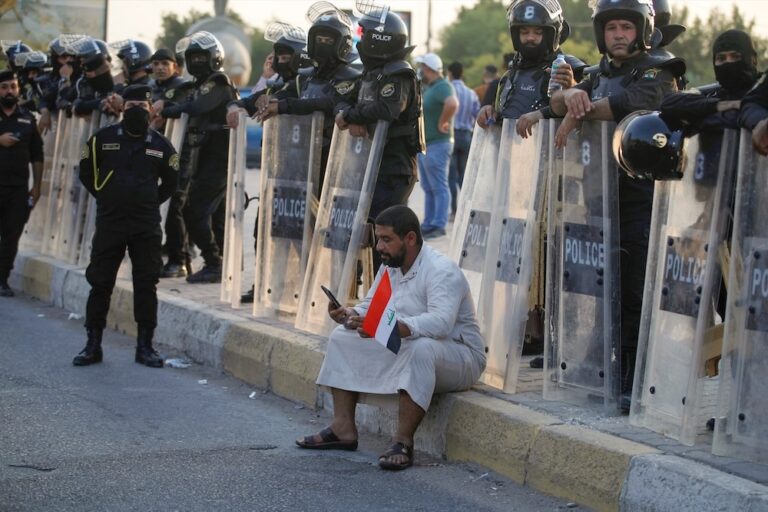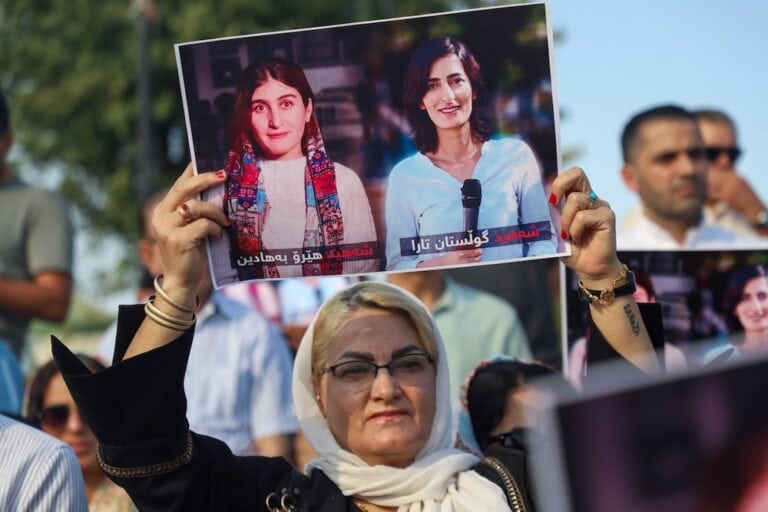(RSF/IFEX) – Reporters Without Borders has learned that three more Iraqi journalists were killed in June 2007. Their deaths bring the number of media workers killed in Iraq since the start of the year to 36. “We extend our condolences to the families of the victims,” Reporters Without Borders said. “Iraqi journalists put their lives […]
(RSF/IFEX) – Reporters Without Borders has learned that three more Iraqi journalists were killed in June 2007. Their deaths bring the number of media workers killed in Iraq since the start of the year to 36.
“We extend our condolences to the families of the victims,” Reporters Without Borders said. “Iraqi journalists put their lives in danger each time they go to work. More and more Iraqi media are leaving the capital for safer locations in the Kurdish north or in neighbouring countries, but their local correspondents are left without any protection and their killers continue to operate with impunity.”
One of the many victims of a bombing in Al-Khalis (55 km north of Baghdad) on 11 June was Aref Ali Falih, 32, who had been the correspondent of the independent news agency Aswat Al-Irak (Voices of Iraq) in the northeastern province of Diyala since December 2006. He was the third Aswat Al-Irak journalist to be killed since 30 May 2007.
The offices of the public TV station Al-Iraqiya in the southern province of Maysan were destroyed in an arson attack on 18 June in which no one was hurt. Mohammed Al-Anwar, the correspondent of the Egyptian daily “Al-Ahram”, sustained an injury to his hand when a car bomb went off in the centre of Baghdad on 19 June.
Poet and journalist Rahim Al-Maliki was killed in a suicide-bombing at the Mansour Hotel in Baghdad on 25 June while a meeting of tribal chiefs was taking place. Maliki, 39, who hosted two cultural programmes on Al-Iraqiya, had been covering the meeting. The two cameramen accompanying him were not hurt.
The Union of Journalists reported that veteran reporter Hamid Abd Sarhan, 57, was ambushed and killed as he drove home on 26 June in the south Baghdad district of Al-Saydiya. Gunmen blocked his car’s passage and shot him several times, killing him instantly. Aged 57, he had worked for more than 30 years for the state-owned news agency until Saddam Hussein’s ouster. Since the US invasion, he had worked for the privately-owned news agency Iraqioun.
According to a police report, Zeena Shakir Mahmoud, 35, a journalist with the newspaper “Al-Haqiqa”, the mouthpiece of the Democratic Kurdish Party, was shot dead in Intisar, in the eastern part of the city of Mosul, on 24 June (see IFEX alert of 27 June 2007). It has not yet been possible to confirm the report of her death with her newspaper.
Reporters Without Borders has also learned that Imad Al-Khaza’i, the correspondent of the privately-owned TV station Al-Baghdadiyah in Diwaniya (180 km south of Baghdad) was detained for several hours by Iraqi security forces for failing to respect a ban on approaching the scene of a bombing. The ban was decreed in May by Prime Minister Nouri Al-Maliki.
A total of 187 journalists and media assistants have been killed since the start of the US-led invasion in March 2003. Two are missing and there has been no news of 14 others since they were kidnapped.


